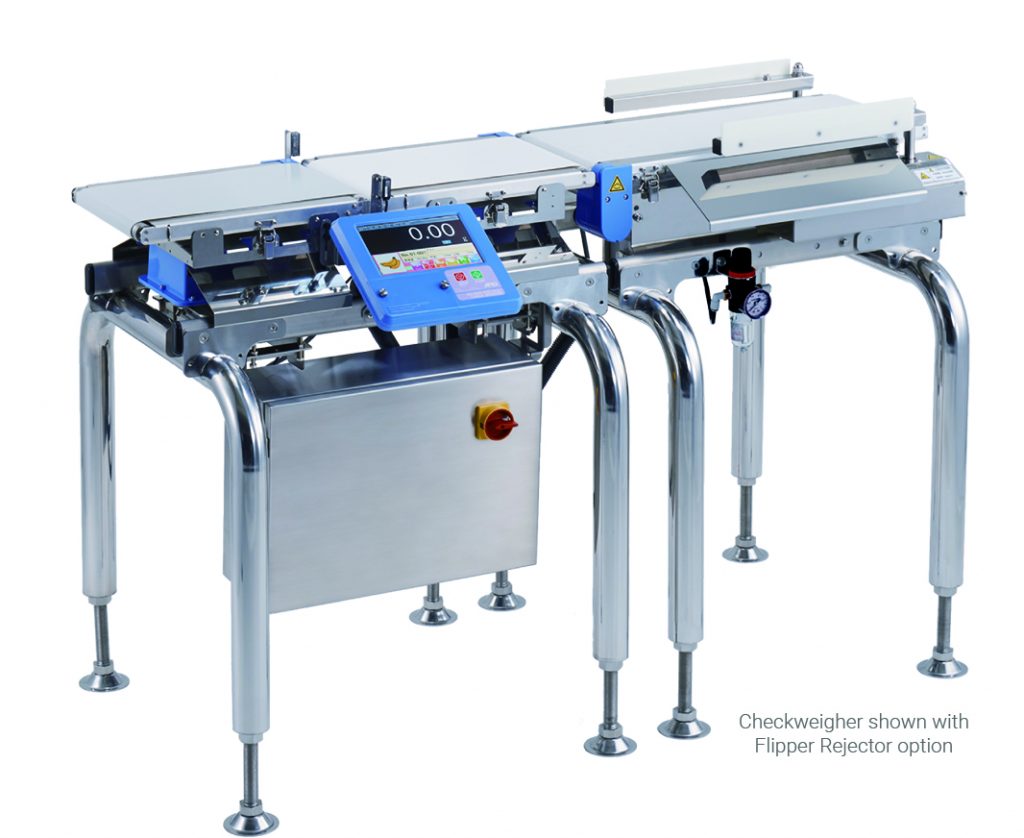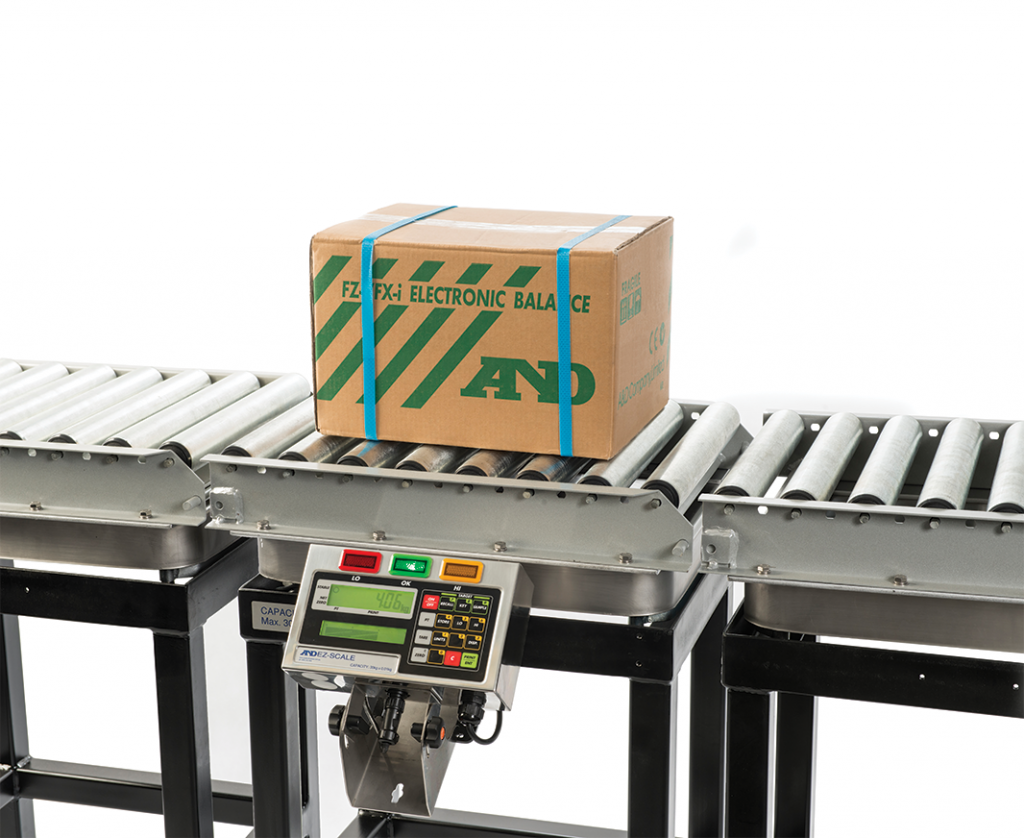What is a checkweigher?
Are you looking for a consistent and reliable way to weigh your products? Checkweighers are automated machines that have been designed to ensure that products are weighed with both efficiency and precision. As such, checkweighers have become common sight additions in modern food manufacturing and packaging lines. Not only can checkweighers reduce the risk of underfill or overfill, but controlled inspection can also flag any quality and safety issues. Delivering consistent quality products is essential to protect your brand and your bottom line, and modern checkweighers have become a valuable investment for companies looking to improve their manufacturing and packaging operations.
There are different types of checkweighers, and while all of them serve the same primary function (ie. weighing products), some differ in terms of methodology and design. One of the more popular designs used in manufacturing environments is the checkweigher conveyor, a design that consists of a static conveyor belt, a load cell, and a digital display. Products can be manually placed on the weighing module, and the checkweigher will then measure the weight of each product as it is passed over the load cell.
An in-line checkweigher is the term used to refer to a checkweigher that has been integrated into a production line. As products automatically move along the conveyor belt, the in-line checkweigher uses various sensors to detect, measure and sort the product based on the packed-size weight. The in-line checkweigher compares the weight of each product to a pre-set target weight range to ensure the weight of a packaged product matches the weight printed in the label. If the product falls outside of this range, it is sorted or rejected from the production line. Checkweighers can also be programmed to reject products that are outside of acceptable weight ranges or that have other quality defects or safety issues.
What products can you inspect on a checkweigher?
Checkweighers are used in a wide variety of industries and have become a significant tool in ensuring that products are weighed and inspected accurately to meet your specified limits. They help companies comply with regulations and improve product quality and traceability. Here are just some of the many industries where checkweighers are ubiquitous…
Food Industry –
Checkweighers are widely used in the food and beverage industry to guarantee that packaged consumer foods meet the required weight standards set by government regulations. Manufacturers must ensure that their products are at the correct weight, and checkweighers play a critical role in achieving this.
Construction Industry:
Checkweighers are used to weigh materials such as cement, sand, and gravel to ensure that they meet the specified weight and quality standards.
Logistics & Distribution Centres –
Checkweighers are used to weigh packages and parcels to ensure that they are within the specified weight range for shipping and distribution.
Agriculture & Farming – Checkweighers are used to weigh harvested crops to ensure that they meet the weight specifications and are priced accordingly.
The Waste Management Industry – Checkweighers are used to weigh waste materials such as scrap metal, paper, and plastics to determine the pricing for recycling and disposal.
The Pharmaceutical Industry – Checkweighers are employed across the pharmaceutical industry to verify the correct dosages of medications, a function that can literally be the difference between life and death when it comes to assessing individual tablets and capsules and rejecting those that do not meet the acceptable weight range.
The Chemical Industry – Checkweighers are used to weigh chemicals and other raw materials to ensure accuracy across the manufacturing process.
The Cosmetics Industry – Checkweighers are used to weigh various cosmetic products such as lotions, creams, and makeup to ensure that they meet the specified weight standards.
How does checkweighing improve a production line?
There are many advantages with adding Checkweighers into your manufacturing process. The use of checkweighers can help with quality control, product uniformity, finding missing components or foreign objects, boost cost savings as well as enhancing overall productivity.
One of the key benefits of checkweighing is reducing product giveaway, ie. the amount of product that exceeds the stated weight limit due to overfilling or variation in product density. While this may sound like a small thing, it can translate into significant volume and cost savings for manufacturers, especially in industries such as food and beverage where the cost of raw materials is particularly high and margins are very tight. By accurately weighing each product and rejecting any that are outside the specified weight range, checkweighers can significantly reduce the amount of product giveaway, which can save manufacturers’ bottom line and resources.
Checkweighing can also help manufacturers ensure compliance with regulatory standards, such as weight and measurement regulations, as well as quality control standards such as HACCP (Hazard Analysis and Critical Control Points) and GMP (Good Manufacturing Practices). Non-compliance with these regulations may incur pricy fines and legal penalties, as well as reputational damage. Checkweighers can help manufacturers circumvent such risks by providing accurate and reliable weighing data, guaranteeing that the products meet the required specifications and standards.
The return on investment (ROI) for checkweighing equipment can be considerable. In addition to the direct cost savings from reducing product giveaway and avoiding potential fines for non-compliance, checkweighers can also provide valuable data insights that can help you reduce waste, optimise your production processes, and improve the overall quality of your products.
Checkweighers can also prove instrumental in improving a company’s sustainability efforts by reducing the amount of waste product and materials.
The range of checkweighers offered by A&D Inspection
A&D Inspection offers a variety of inspection systems that have been designed to meet the needs of various Australian manufacturing and packaging companies. Our in motion checkweighers as well as static checkweighers are designed to deliver consistent quality to protect your brand and your bottom line.

Accelerate your productivity with the highly-efficient A&D Intelligent 2kg Checkweigher. This in motion checkweigher has been specially designed to weigh, classify and segregate products based on weight, and is versatile with its dual range capacity and high repeatability. This A&D checkweigher can also help evaluate trends with the stored data accumulation, and its unique modular structure and design allows for simple in-line integration or relocation in the production line.

If you’re after a freestanding gravity system be incorporated into a new or existing work station, you may want to look at something like the EZI-Check Carton Checking System, a freestanding gravity roller checkweigher with fast stabilisation, that can accurately check cartons for missing or damaged products.
All A&D Inspection checkweighers are built to meet Australia’s high safety standards, and are constructed using quality materials to ensure compliance with food safety regulations. You can view our in-line checkweigher range here.
The Final Word
Checkweighers play a critical role in improving the efficacy, quality control, and compliance of manufacturing and packing industries. Checkweighers can provide a considerable ROI, making them a valuable investment for manufacturers looking to boost their profits. If you’re ready to optimise your company’s productivity with a checkweigher, you can get in touch with our friendly staff here or you can explore the range of in-line checkweighers here.

